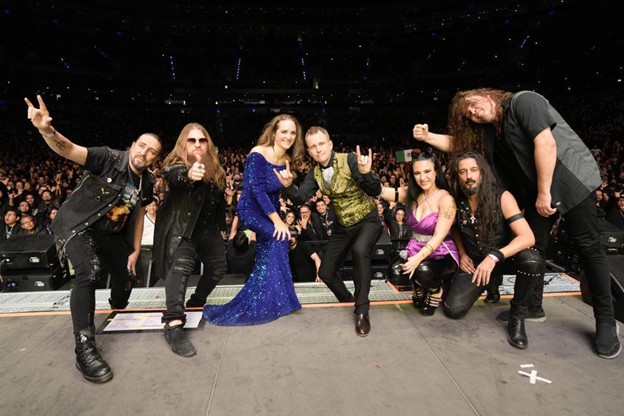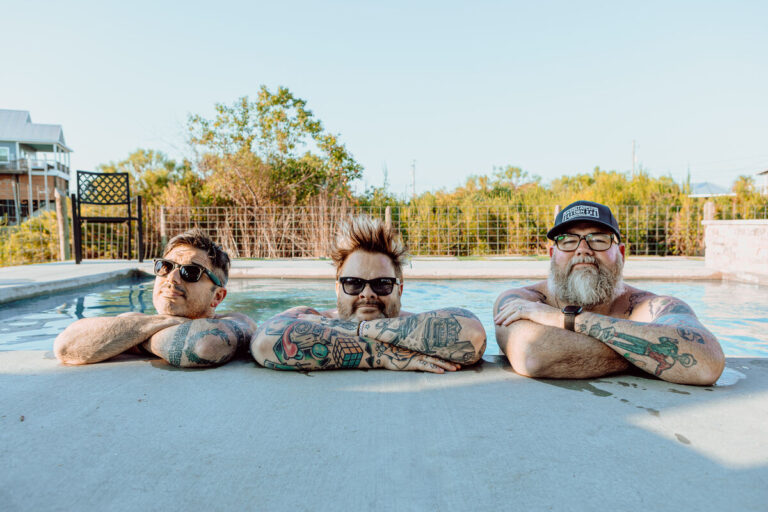Change is a perilous endeavour for any band, just ask Metallica and Paradise Lost to name but two, and yet for any band not willing to become the AC/DC of their genre, change is a necessary part of artistic evolution. There’s nothing wrong with remaining genre loyal if that is where your heart lies, but it is arguably far worse to continue to engage with a form of music for which you no longer have a passion than to embrace the new. However, whilst it is one thing to rationalise the necessity for change, it is quite another to convince a loyal fan-base of the argument, and in this latter task Suicide Silence have clearly struggled. First single ‘Doris’ was met with a mixture of scepticism and, in some cases, outright derision. In a remarkable case, a petition was created by fans of the band urging them to release the album under any name other than Suicide Silence. Such a move seems unprecedented and the only parallel which comes to mind is when Geffen sued Neil Young for making ‘unrepresentative’ records, an unsavoury incident and yet one from which Neil emerged with his integrity intact.
As with all these things, perhaps it will take time to see past the throat-ripping criticisms and threats to burn Suicide Silence merch en masse. Certainly there are plenty of stylistic shifts, poorly received upon their release, that have grown in stature over the years (Paradise Lost’s ‘Host’ springs immediately to mind), and whilst it is easy to see why fans might be confused by the stylistic leap Suicide Silence have taken on this album, it’s likely that the level of criticism is more about bandwagon jumping than honest opinion.
I’m going to come right out and say it: I like ’Doris’. I like the atonal guitar work and raw, Ross Robinson production job and whilst I can see that it is a radical departure from the far more polished ‘you can’t stop me’, I’m not at all convinced that that is a bad thing. With huge churning riffs, odd spacey interludes and textured vocals, it’s a huge, arty, bewildering track that eschews precision for spontaneity in a manner that feels entirely unforced. You can sense Mark Heylman and Chris Garza are exploring far beyond their comfort zone, trying out different structures and sounds whilst still tethering the track to the ferocious riffs for which they’re known. Certainly, the Deftones influence is writ large, but considering that nu metal is anything but a commercial direction in which to venture, you can hardly argue that the band produced this record with dollar signs in their eyes. Venturing even further form the template of deathcore, ‘Silence’ digs into the echoing, prog-nu-metal hybrid characterised on the Deftones’ ‘White pony’. Step outside of the fact that it is the band Suicide Silence for a moment and what you have is a fine, deftly produced track that juxtaposes echoing guitar passages and eerie, clean vocals with pummelling riffs and a nagging melody that won’t quit. Heavier and with a powerful groove, ‘Listen’ sees Dan Kelly employ a creeping bass line underpinning the down-tuned guitars whilst Eddie explores a range of vocal styles, veering from softly spoken to phlegm-soaked roar that suggests that just because the album is “70% clean vocals” (and since when did such statistics matter anyway?) it’s hardly an easy ride. A highlight is the dreamy ‘dying in a red room’ with its echoing vocals and somnolent beat drawing the listener into a dark dreamscape in which Eddie whispers over stuttering electronics and edgy, nerve-wracked guitar. It’s the most sonically adventurous music the band have ever attempted and whilst the departure is a sharp one, it remains fascinating. Emerging from the dazed, distortion—laden pile up that concludes ‘dying…’ ‘Hold me up hold me down’ is the sound of collective psychosis more reminiscent of Faith No More than Korn with its tribal drums and unhinged screams. It stuns with its bludgeoning force and it’s clear that Ross Robinson has lost none of his touch when it comes to giving free reign to a band’s more outré impulses during recording.
Wrongfooting the listener with a woozy drum beat, ‘Run’ explodes into a thousand points of light before heading into a darkened tunnel that sounds like a cross between latter day Gary Numan and much missed Brit metallers Pulkas. Punishingly heavy, the decision to swathe the chorus vocal in distortion is liable to prove too much for some, harking back, as it does, to the likes of Coal Chamber and Deftones, but it certainly suits the mood of the song. The pace slows on the echoing ‘The zero’ which digs all the way back to The Cure to seek its influences, although the guitars are never far behind and the riffs carry considerable heft. Considerably more adventurous around his kit, Alex Lopez demonstrates an impressive and jazz-infused versatility, not least on the crushing breakdown that concludes the song. The pointed ‘Conformity’ has a vibe reminiscent of slipknot’s ‘snuff’ with its beautiful guitar work and skilfully woven layers building toward a suitably explosive climax complete with blistering solo. The album ends with ‘Don’t be careful you might hurt yourself’, a bruising, rhythmic monster of a track that seems to simmer with repressed rage and a nervous energy only to end in a bizarre bout of jaunty whistling and squally feedback that either represents a complete mental breakdown or highlights the band’s complete lack of concern about putting such a diverse work out into the public domain.
Perhaps ‘Suicide Silence’ is a temporary shift – an artistic statement that the band needed to make at this point in their career – or perhaps it signals a permanent shift in sound. Regardless, the decision to make this record was a brave one and although it is hard to believe that the band successfully predicted the level of hatred that would be directed at it, it is equally hard to believe that they did not foresee the turbulent times that would ensue from such a change in direction. Nonetheless, looking at the feedback that has started to appear, it is tempting to wonder at the extent to which the public tail is wagging the critical dog, with a number of critics falling over themselves to condemn the record in the harshest possible terms. The truth is that if this was a record by a band other than Suicide Silence, it would be receiving praise for its diverse arrangements, arty riffs and hazy production and so the problem lies in the name and a rather disappointing kowtowing to convention from a genre that claims to pride itself on its individuality and sense of freedom. Nonetheless, it is churlish not to acknowledge that the album is a hell of a stylistic shock to the system and there is no question that Suicide Silence will jettison a good degree of their following if they continue on this path and that is, to an extent, understandable. Whether the band can weather the storm remains to be seen, but taken on its merits as an album and regardless of the expectations that lie with a name, ‘Suicide Silence’ is a brave, artistic and exciting record and the band deserve credit for being true to their own artistic impulses, even at the expense of commercial and (in some cases) critical respect. Perhaps history will see me on the wrong side of the argument and the band will turn their back upon their newfound sound in the coming months or years, but I would far rather listen to a group of musicians who follow their muse, even at the expense of an established fan-base, than pay tribute to a band who play it safe on every record. 8





